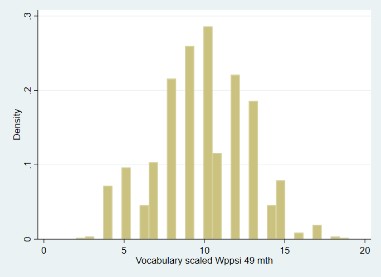The Avon Longitudinal Study of Parents and Children (ALSPAC) assessed their cohort members (CMs) at 49 months’ age (Children in Focus Clinic) using the Vocabulary measure from the Wechsler Preschool and Primary Scale of Intelligence Revised (WPPSI-RUK).
Details on this measure and the data collected from the CMs are outlined in the table below.
| Year of data collection: | 1996-1997 |
| Domain: | Verbal ability |
| Measures: | Verbal comprehension |
| Lexical knowledge | |
| Long-term memory | |
| Language development | |
| CHC: | Gc (Crystallised intelligence) |
| CLOSER Source: | Explore this sweep in CLOSER Discovery: ALSPAC Early Years (13 months to 4 years 11 months) (opens in a new tab) |
| Administration method: | Trained interviewer; clinical setting; pen and paper, oral response |
| Procedure: | The test contained both picture and verbal sections. The first three items consisted of arrays of pictures, and the child was asked to point to a particular image. If the child provided an incorrect answer on the first question, the interviewer pointed out the correct answer. The remaining items (4-25) consisted of words that the interviewer read aloud and asked the child to define. Items 1-3 were worth 1 point each, whereas items 4-25 are worth scored on a 0 - 2 point scale. |
| Link to questionnaire: | http://www.bristol.ac.uk/alspac/researchers/our-data/clinical-measures/ (opens in new tab) |
| Scoring: | Standardised score (M = 10, SD = 3) |
| Item-level variable(s): | Not readily available |
| Total score/derived variable(s): | cf809 Explore this variable in CLOSER Discovery: ALSPAC Children in Focus 4Mth-61Mth Clinics Dataset (opens in a new tab) |
| Descriptives: | Raw score |
| N = 1,006 | |
| Range = 2 - 19 | |
| Mean = 9.87 | |
| SD = 2.92 | |
(click image to enlarge) |
|
| Age of participants (weeks): | Mean = 212.39 weeks, SD = 1.63, Range = 207 - 221 |
| Other sweep and/or cohort: | ALSPAC – Age 15.5 – WASI Vocabulary |
| Source: | Wechsler, D. (1989). Wechsler Preschool and Primary Scale of Intelligence-Revised. WPPSI-R. Psychological Corporation. |
| Technical resources: | Kaufman, A. S., & Lichtenberger, E. O. (2000). Essentials of WISC-III and WPPSI-R Assessment. John Wiley & Sons Inc. |
| Example articles: | Gathercole, S. E., Tiffany, C., Briscoe, J., Thorn, A., & ALSPAC team. (2005). Developmental consequences of poor phonological short-term memory function in childhood: A longitudinal study. Journal of Child Psychology and Psychiatry, 46(6), 598-611. |
| Gathercole, S. E., Briscoe, J., Thorn, A., Tiffany, C., & ALSPAC Study Team. (2008). Deficits in verbal long-term memory and learning in children with poor phonological short-term memory skills. The Quarterly Journal of Experimental Psychology, 61(3), 474-490. |
For the named item in the table above, a link is provided to the corresponding CLOSER Discovery content.
Go to:
- Overview of all cognitive measures in ALSPAC
- Overview of childhood cognitive measures across all studies
This page is part of CLOSER’s ‘A guide to the cognitive measures in five British birth cohort studies’.
